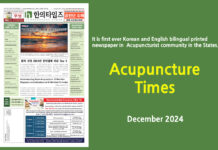
By David Lee, L.Ac.
Is it possible to unify acupuncture and herbal medicine under one theory? Or are we chasing a pipe dream with very little possibility? Well, under constitutionology, a single diagnosis for both acupuncture and herbal medicine is now a reality. Saam acupuncture, Sasang medicine, and Eight Constitutions acupuncture had paved the way for the final key that solved the problem and seamlessly integrated them. You may wonder since herbal and meridian theories are mutually exclusive, there cannot be a direct relation. I implore you to reconsider based on the rationale and final key provided below.
Let’s begin with a Soeumin diagnosis. According to Jema Lee, a Soeumin has big Kidney and small Spleen organs, which are confirmed with diet and herbal medicine. On the other hand, Sasang acupuncture utilizes Transporting Shu points for the constitutions. This means an individual is born with immutable constitutional acupuncture points, which do not change in a person’s lifetime. A Soeumin has deficient Fire, deficient Earth, and excessive Water when directly transposed from Zang organs to five elements. Four Needle Technique points for Soeumin are 대도 SP2 (Fire), 소부 HT8 (Fire), 음릉천SP9 (Water), and 음곡KD10 (Water). These points help to tonify Fire and Earth; and sedate Water. The outcome is an improvement of pain, inflammation, and dysfunction because they help the body to self-heal. Furthermore, these points are applicable for 70% of Soeumins.
The final key that further increases reliability and therefore confirms the Sasang acupuncture is the alternate five-element order, which occurs in 30% of Soeumins. The alternate five-element order for the Yin Transporting points is same as that of the Yang Transporting points. Lee DongWoong, a scholar in Oriental medicine, in 1999 proposed in his text Physical Constitution by Yin Yang Theory that 정 Well- Metal, 형 Spring-Water, 수 Stream-Wood, 경 River-Fire, and 합Sea-Earth apply to Yin points resulting in 상구SP5 (Fire), 영도HT4 (Fire), 대도 SP2 (Water), and 연곡KD2 (water).
The above two sets of acupuncture points do not work on Soyangin. However, Taeeumins respond well to these points. How could this be? It also works for Taeeumins because of two reasons. One reason is that the Taeeumins have opposite five-element states of excessive Fire, excessive Earth, and deficient Water in addition to having big Liver (Wood) and small Lung (Metal). The other reason is that the body automatically adjusts the excessive and deficient states, neither by acupuncture manipulation of inserting against/along the meridian flow nor by twisting them clockwise or counter-clockwise. Only stimulation by breaking of the skin with a needle is enough for the body to react according to its need. Again, manipulation does force an increase or decrease response.
Then how can a practitioner distinguish a Soeumin from Taeeumin if both have good relief with the same points? There are many ways to identify the constitution. Since a constitution is broadly encoded in the DNA, it manifests itself in multiple ways through psychological, physiological, and physical means. Here are some examples. Psychologically, a Soeumin is gentler and less aggressive than Taeeumins. Physiologically, a Soeumin is prone to motion sickness and sensitive to caffeine while Taeeumins are not. Physically, torso shape of a Soeumin is an hourglass with slim waist, whereas a Taeeumin has a shape of a diamond with wide abdomen and flared lower ribs.
Our collective aspiration to discover the key that unifies acupuncture and herbal medicine under constitutionology is now realized. It is your turn to verify its efficacy through your patients. It will increase your satisfaction. Then we can confidently put forth our pride in Korean medicine into the world.
































사상체질침이 최초 이제마의 사상의학하고 합치게 됬습니다.
YOUR POST IS VERY VALUABLE TO US SO WE ENJOY READING IT. .
GO GO GO
Comments are closed.